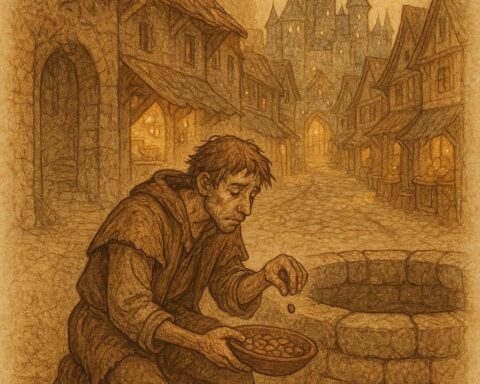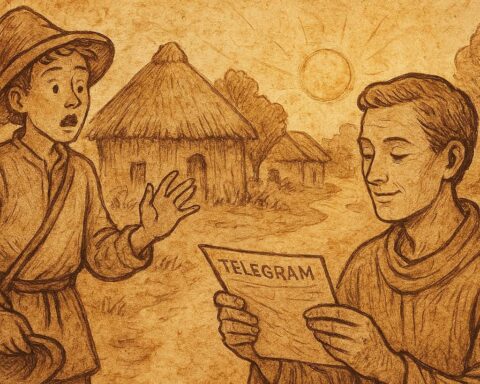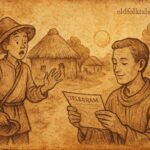Once, in a small village in Ghana, there lived a humble man with his young son and a faithful donkey. One bright morning, they set out for the market, the donkey plodding ahead with slow, steady steps. The man, weary from life’s many burdens, climbed onto the donkey’s back, while his son walked alongside him, sandaled feet brushing the dusty path.
As they walked, villagers began passing them, casting disapproving glances. “Shame, shame on that man!” one exclaimed. “He rides while his son trudges on foot!” The man, cheeks burning with embarrassment, looked down at his son, who seemed small and weary in the sun. He sighed, dismounted, and gently lifted his son onto the donkey, climbing down himself.
The two resumed their journey, the boy now perched on the donkey with a mixture of pride and trepidation. But soon, another group of villagers approached. “Shame, shame on that boy!” they cried. “He rides while his father walks!” The man paused, frustration knitting his brows. He glanced at his son and then at the people whose words seemed to carry more weight than reason.
With a resigned nod, they both stepped down and began walking side by side, letting the donkey move freely at their pace. Their hearts were heavy with the conflicting judgments of others, yet they tried to ignore the murmurs. But as they walked past more villagers, laughter and scorn filled the air. “What fools!” one shouted. “They have a donkey and don’t ride it! Look at them struggle on foot!”
The man and his son shared a glance, a mix of amusement and exasperation crossing their faces. They shrugged and decided, perhaps they might try riding together. They mounted the donkey, the animal groaning under the sudden weight of both bodies. As they moved slowly along the path, another crowd approached, pointing and laughing. “Shame on them!” they cried. “Two riding on one weak donkey! They’ll surely break it!”
The man, now more bewildered than ever, lifted his son down, and the two dismounted again. Their minds spun with the contradictions of the villagers’ words. How could anyone satisfy them? Yet, the son, young and earnest, looked up at his father and asked quietly, “Father, what shall we do?”
In a moment of both cleverness and desperation, the man tied the donkey’s legs together and hoisted the animal onto a sturdy pole. Together, he and his son carried the donkey on their shoulders, straining under the weight as sweat dampened their brows. They moved slowly through the village, determined to take a stand, or at least escape judgment.
But no sooner had they taken a few steps than the villagers’ laughter erupted anew. “Look at these fools!” one shouted. “They are carrying the donkey! Madness! Who would do such a thing?” The father’s lips pressed into a thin line. The boy’s small shoulders trembled under the burden, and yet he met his father’s gaze with quiet trust.
Finally, the man set the donkey down, panting and exhausted. He looked around at the village, at the people who criticized every choice, and he smiled wryly. “My son,” he said, brushing dust from his hands, “we cannot please everyone. Some will always find fault, no matter what we do. Let us follow our own path and care for each other.”
With that, the man and his son led the donkey peacefully down the path, ignoring the murmurs and laughter of those who sought to judge. The sun began to lower in the sky, casting long shadows that mirrored the wisdom they had gained: that life is too short to bend entirely to the opinions of others, and that true guidance comes from understanding and supporting one another.
Moral Lesson
Attempting to please everyone will lead only to frustration. Wisdom lies in following your own path, considering the needs of those close to you, and letting go of the judgments of others.
Knowledge Check
Who are the main characters of the story?
The man, his son, and their donkey.
What prompts the father and son to change how they travel?
The villagers’ constant criticism of how they use the donkey.
What lesson does the story teach about public opinion?
Trying to satisfy everyone’s expectations is futile.
What actions did the man and his son take with the donkey?
First, the father rode; then the son; then they walked together; next they both rode; finally, they carried the donkey.
What is the ultimate realization of the father and son?
They cannot please everyone and should focus on their own judgment and care for each other.
What is the cultural origin of the folktale?
Ghanaian, Ashanti folktale
Source: Ghanaian Folktale






